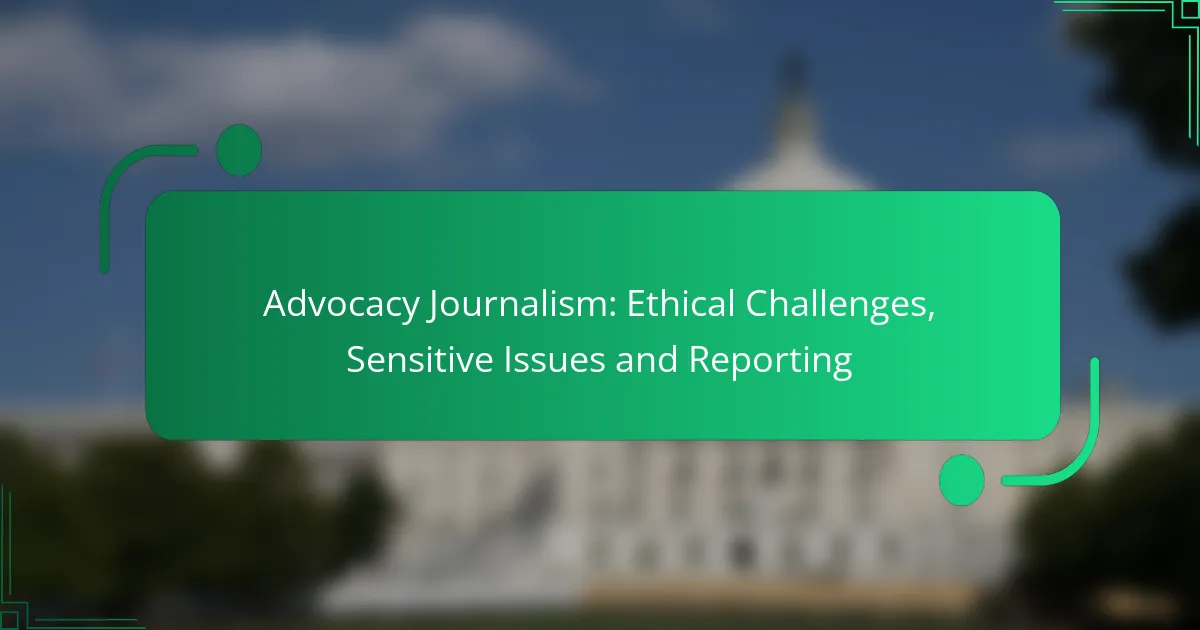Advocacy journalism plays a crucial role in highlighting social issues, yet it grapples with significant ethical challenges that can undermine its integrity. Journalists must balance objectivity with their commitment to social causes, navigate conflicts of interest, and ensure accountability while respecting the privacy of individuals involved. By prioritizing ethical considerations and engaging thoughtfully with communities, journalists can foster trust and deliver accurate, impactful reporting on sensitive topics.
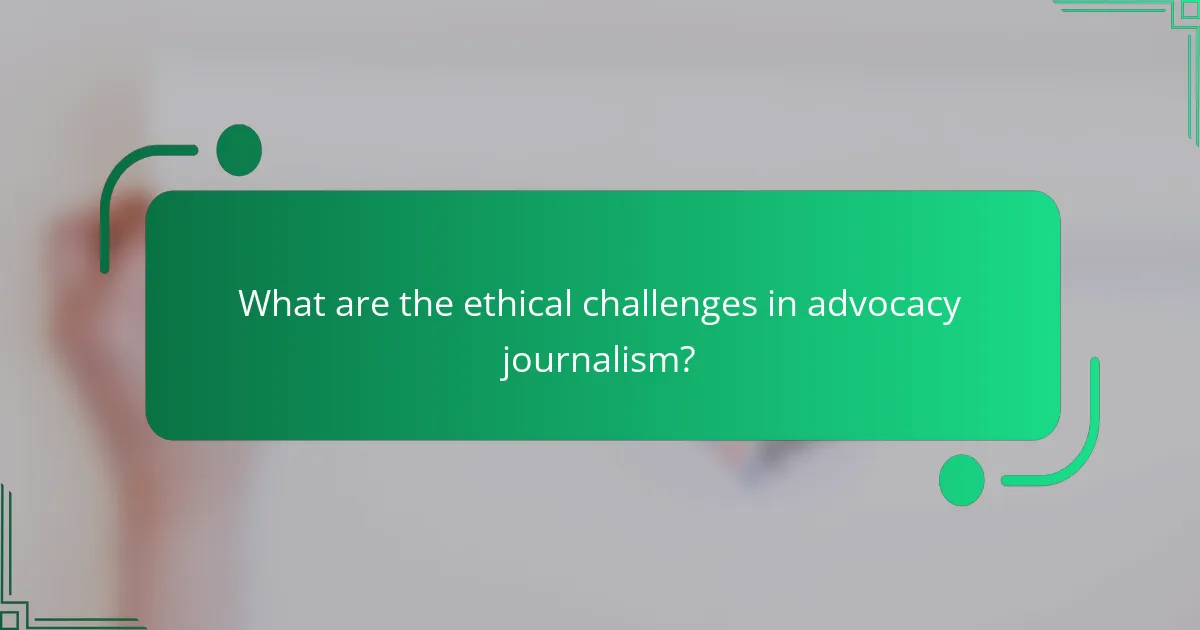
What are the ethical challenges in advocacy journalism?
Advocacy journalism faces several ethical challenges that can compromise its integrity and credibility. Key issues include maintaining objectivity, managing conflicts of interest, ensuring accountability, addressing public perception, and respecting privacy.
Bias and objectivity
Bias in advocacy journalism can undermine the objectivity that is crucial for credible reporting. Journalists must strive to present facts fairly while advocating for specific causes, which can be a delicate balance. It is essential to disclose any potential biases to maintain trust with the audience.
To mitigate bias, journalists can use multiple sources and perspectives, ensuring a more rounded view of the issue. Regular training on ethical reporting practices can also help journalists recognize and address their own biases.
Conflicts of interest
Conflicts of interest arise when a journalist’s personal interests or affiliations may influence their reporting. This can lead to a lack of impartiality and damage the credibility of the journalism. Journalists should be transparent about any affiliations that could be perceived as conflicts.
To navigate conflicts of interest, journalists should establish clear guidelines for disclosure and consider recusing themselves from reporting on issues where their impartiality could be questioned. Regular audits of their work can help identify potential conflicts.
Accountability and transparency
Accountability and transparency are vital for maintaining trust in advocacy journalism. Journalists must be willing to stand by their work and correct any errors promptly. Transparency about the sources of information and the methods used in reporting is equally important.
Establishing a clear feedback mechanism for audiences can enhance accountability. Journalists should encourage public engagement and be open to criticism, which can help improve the quality of their reporting.
Impact on public perception
Advocacy journalism can significantly shape public perception of issues, which carries ethical responsibilities. Journalists must be aware of how their framing of stories can influence attitudes and beliefs. Misrepresentation or sensationalism can lead to misinformation and public harm.
To minimize negative impacts, journalists should focus on providing context and factual information. Engaging with experts and community members can help ensure that the coverage reflects a balanced view of the issue.
Privacy concerns
Privacy concerns are a critical ethical challenge in advocacy journalism, especially when reporting on vulnerable populations. Journalists must navigate the fine line between the public’s right to know and an individual’s right to privacy. Invasive reporting can cause harm and distress to subjects.
To address privacy concerns, journalists should obtain informed consent when possible and consider the potential consequences of their reporting on individuals. Implementing strict guidelines on how personal information is handled can help protect the privacy of subjects involved in advocacy stories.
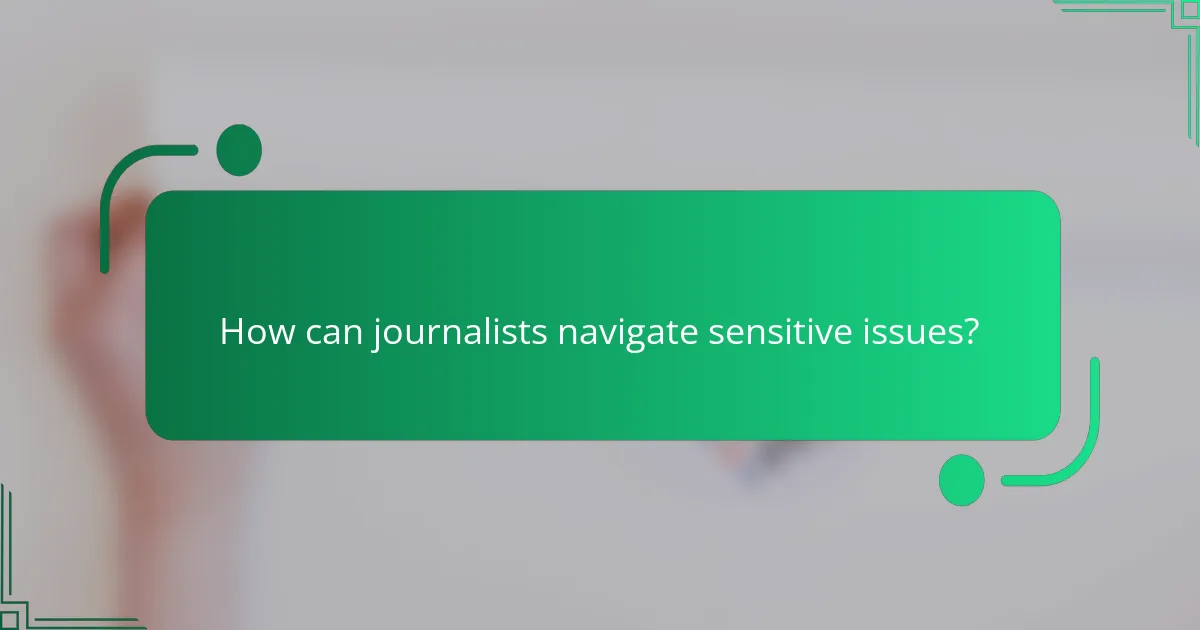
How can journalists navigate sensitive issues?
Journalists can navigate sensitive issues by prioritizing ethical considerations, understanding the impact of their reporting, and engaging with the communities involved. This approach fosters trust and ensures that the coverage is respectful and accurate.
Understanding cultural contexts
Understanding cultural contexts is crucial for responsible journalism. Each community has its own values, beliefs, and sensitivities that shape how issues are perceived. Journalists should research and immerse themselves in the cultural backgrounds of the subjects they cover to avoid misrepresentation.
For instance, when reporting on issues like immigration, recognizing the historical and social factors influencing a community’s perspective can lead to more nuanced storytelling. Engaging with local experts or cultural leaders can provide valuable insights.
Engaging with affected communities
Engaging with affected communities is essential for ethical reporting. Journalists should seek to build relationships with those impacted by the issues they cover, allowing for more accurate representation of their experiences and viewpoints. This can involve attending community meetings or conducting interviews that prioritize the voices of those directly affected.
For example, when covering a natural disaster, journalists might collaborate with local organizations to understand the needs and concerns of survivors. This not only enriches the reporting but also fosters a sense of accountability and respect.
Utilizing trauma-informed reporting
Utilizing trauma-informed reporting involves recognizing the potential emotional impact of stories on both subjects and audiences. Journalists should approach sensitive topics with care, ensuring that their reporting does not re-traumatize individuals or communities. This can include using trigger warnings and providing resources for support.
Practically, journalists can adopt guidelines that emphasize empathy and sensitivity. For instance, when interviewing survivors of violence, it’s important to allow them to share their stories at their own pace and to respect their boundaries. This approach not only enhances the integrity of the reporting but also contributes to the healing process for those involved.
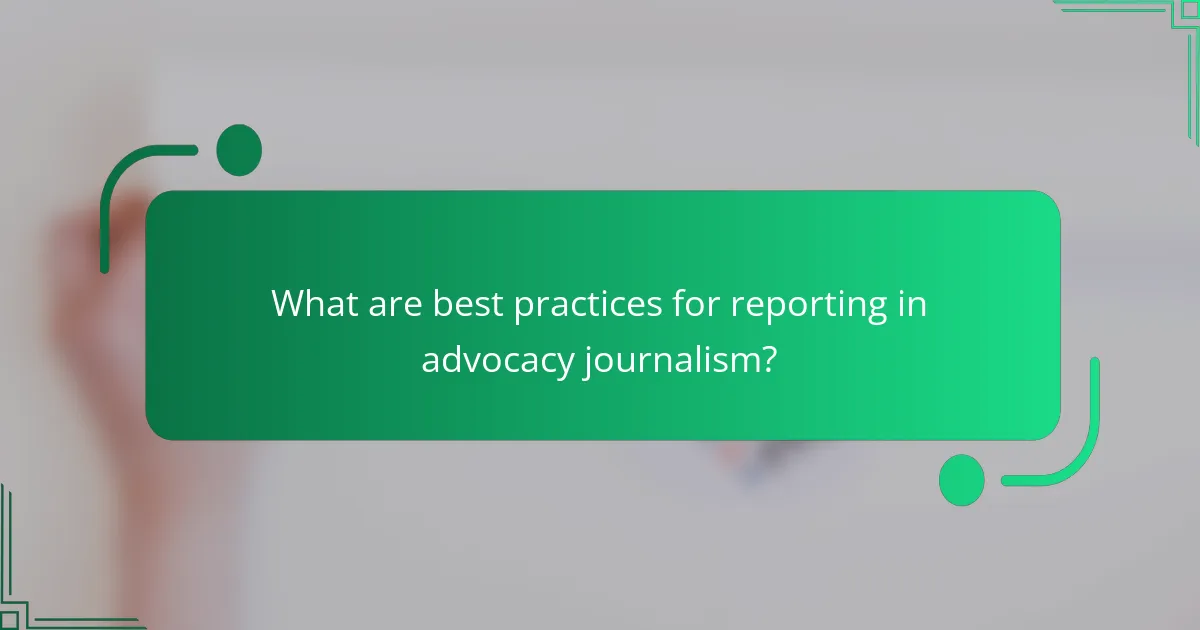
What are best practices for reporting in advocacy journalism?
Best practices in advocacy journalism focus on ensuring accuracy, ethical sourcing, and maintaining independence while promoting social causes. These practices help journalists navigate the complexities of sensitive issues while maintaining credibility and trust with their audience.
Fact-checking and verification
Fact-checking is crucial in advocacy journalism to ensure that the information presented is accurate and reliable. Journalists should cross-reference facts with multiple credible sources before publication, especially when reporting on contentious or sensitive topics.
Utilizing established fact-checking organizations can enhance the credibility of the reporting. A good practice is to verify statistics and claims through reputable databases or peer-reviewed studies, which can help avoid the spread of misinformation.
Ethical sourcing of information
Ethical sourcing involves obtaining information from reliable and responsible sources, ensuring that their perspectives are represented fairly. Journalists should prioritize transparency about where information comes from and the motivations of their sources.
When dealing with sensitive issues, it is essential to consider the potential impact on individuals and communities involved. Always seek informed consent when interviewing vulnerable populations, and be mindful of how their stories are portrayed.
Maintaining editorial independence
Maintaining editorial independence is vital for credibility in advocacy journalism. Journalists should avoid conflicts of interest by clearly separating their advocacy efforts from their reporting roles.
Establishing clear guidelines on how to handle funding sources and partnerships can help preserve independence. Transparency about affiliations and potential biases can also build trust with the audience, ensuring that the reporting remains objective and fact-based.
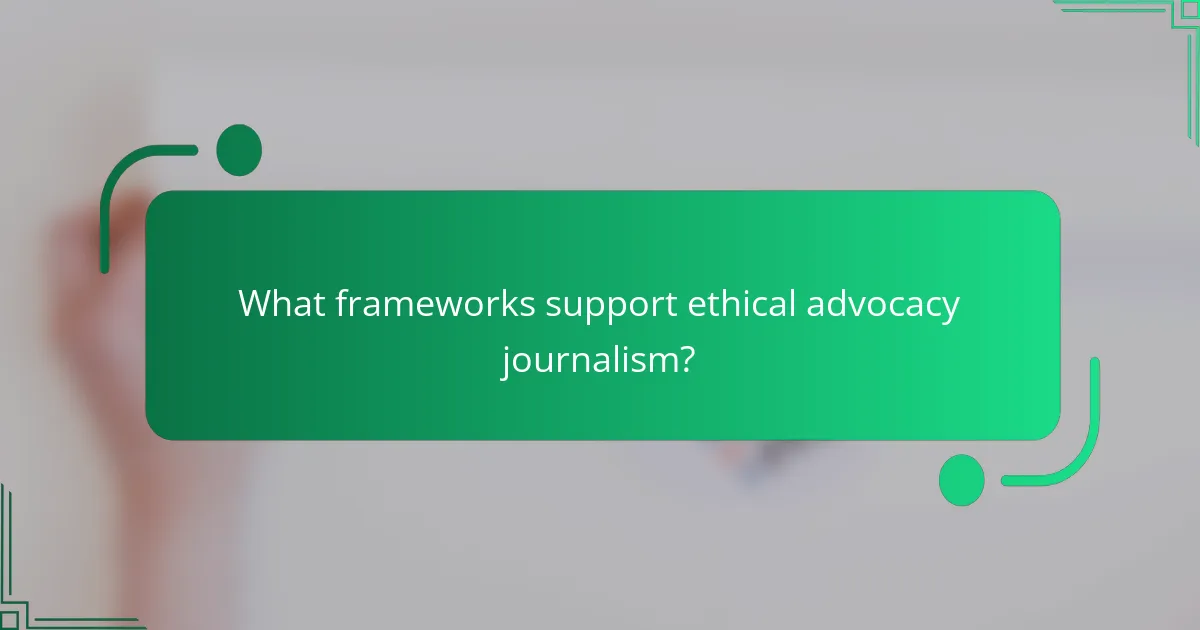
What frameworks support ethical advocacy journalism?
Ethical advocacy journalism is supported by various frameworks that guide journalists in maintaining integrity while promoting social change. These frameworks include established codes of ethics, peer review processes, and editorial oversight that help ensure responsible reporting on sensitive issues.
Code of ethics from journalism organizations
Many journalism organizations, such as the Society of Professional Journalists (SPJ) and the International Federation of Journalists (IFJ), provide codes of ethics that serve as foundational guidelines for journalists. These codes emphasize principles like accuracy, fairness, and accountability, which are crucial for ethical advocacy journalism.
For example, the SPJ code encourages journalists to seek truth and report it, while also advocating for the rights of individuals and communities. Adhering to these ethical standards helps journalists navigate the complexities of advocacy while maintaining credibility.
Peer review and editorial oversight
Peer review and editorial oversight are essential components in the ethical framework of advocacy journalism. Peer review involves having other journalists or experts evaluate the content for accuracy and bias before publication, ensuring that the reporting is well-rounded and credible.
Editorial oversight further enhances this process by providing an additional layer of scrutiny. Editors can help identify potential ethical dilemmas and ensure that the advocacy message aligns with journalistic standards. This collaborative approach reduces the risk of sensationalism and promotes responsible reporting.
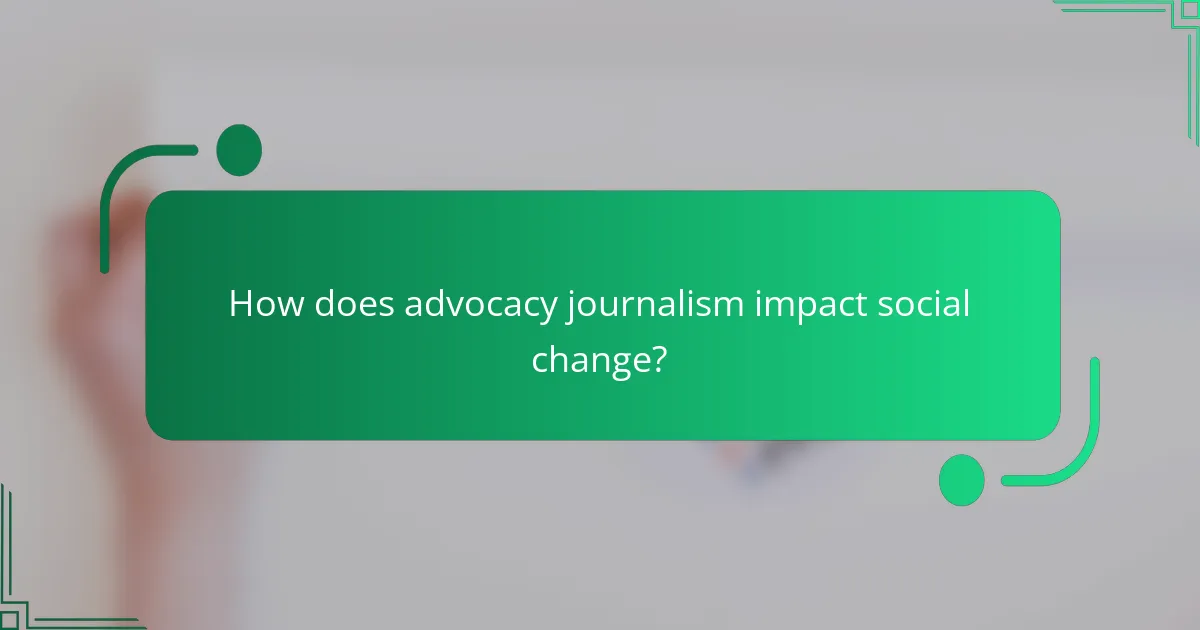
How does advocacy journalism impact social change?
Advocacy journalism plays a crucial role in driving social change by highlighting issues that may be overlooked and mobilizing public opinion. By focusing on specific causes, it can influence attitudes and encourage action among individuals and policymakers alike.
Raising awareness on critical issues
Advocacy journalism effectively raises awareness by bringing attention to pressing social issues, such as climate change, human rights violations, and public health crises. Journalists often use compelling narratives, personal stories, and data to illustrate the urgency of these matters.
For instance, a series of articles on homelessness can humanize the issue by featuring interviews with affected individuals, thereby fostering empathy and understanding among readers. This approach can lead to increased public discourse and a greater demand for solutions.
Influencing policy and legislation
By informing the public and decision-makers about critical issues, advocacy journalism can significantly influence policy and legislation. Journalists often collaborate with activists and experts to present well-researched arguments that highlight the need for specific changes in laws or regulations.
For example, investigative reports on environmental pollution can prompt local governments to implement stricter regulations. Additionally, advocacy journalism can mobilize grassroots movements, which can further pressure policymakers to act. Engaging with the community through public forums or social media can amplify these efforts and ensure that diverse voices are heard in the legislative process.
